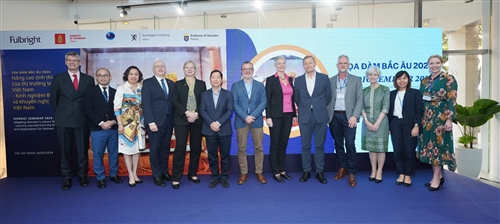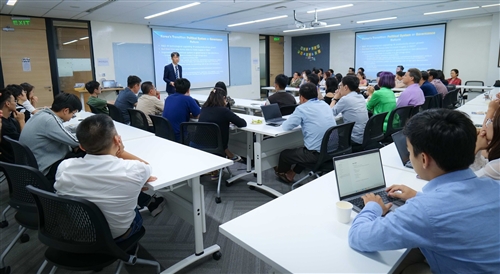Nearly 60 people attended in person and online the Workshop on Zero-Emission Vehicle Development Policy: International Experience for Vietnam, organized by the Fulbright School of Public Policy and Management (FSPPM), Fulbright University Vietnam, at its campus on April 10th.
The workshop aimed to share and discuss the preliminary research findings on international experience in developing policies for ZEVs, as well as the preconditions that need to be considered in applying and developing policies for Vietnam.

Dr. Vu Thanh Tu Anh, Dean of School of Public Policy and Management, Fulbright University Vietnam delivered the opening remark.
In his opening remarks, Dr. Vu Thanh Tu Anh, Dean of the Fulbright School of Public Policy and Management, emphasized the timeliness of the workshop, given Vietnam's commitment to achieve Net-Zero by 2050. He expressed hope that the workshop would foster understanding of the associated challenges and pave the way forward. Dr. Tu Anh underscored the importance of introducing research context and sharing initial findings while also seeking to learn from the experiences of the audience and international counterparts, particularly from other developing countries facing similar challenges.
Wrapped up in one morning, the conference went through 6 presentations with the topics: Vietnam's Policy Landscape for Zero-Emission Vehicles; Learnings from global advanced ZEV programs; ZEV Policy and Energy Efficiency in Vietnam; Greening urban traffic; Private Sector Financing – Clean Buses; And Zero-emission Transportation: Showcase of Hydrogen Transportation Project in Ho Chi Minh City.

Dr. Pham Van Dai, School of Public Policy and Management, Fulbright University Vietnam presented the topic on Vietnam's Policy Landscape for Zero-Emission Vehicles.
Dr. Pham Van Dai, lecturer of FSPPM kicked off the presentation session, delving into Vietnam's ambitious commitment to zero-emission vehicles amidst global climate efforts. With over 140 countries targeting net-zero emissions by mid-century, Vietnam's stance appears notably assertive compared to its peers. Dr. Dai highlighted the pressing need for a transition strategy, navigating challenges such as energy security and GDP impacts. The discussion revolved around approaches like incentive-based schemes versus regulatory mandates, considering international best practices and stakeholder concerns from various sectors including environment, transportation, finance, consumers, and industry.

Dr. Feng An, President, Innovation Center for Energy and Transportation (ICET), USA presented the topic on Learnings from global advanced ZEV programs.
Following Dr. Dai's opening presentation, Dr. Feng An, President of the Innovation Center for Energy and Transportation (ICET) based in the USA, led the second presentation on the topic of insights gained from global advanced Zero Emission Vehicle (ZEV) programs. He stressed the importance of initiating ZEV transitions early, likening it to a "log-in effect" where the sooner the start, the better the outcome. He highlighted key global NEV and ZEV markets such as China, Europe (Norway), and the US, citing Tesla as a prime example of navigating regulatory credits for profitability. Dr. An also discussed emerging ZEV markets in the Asia-Pacific region, emphasizing lessons learned and strategies for Vietnam, including international cooperation, clear targets and policies, strategic planning, cleaner energy, charging network expansion, and public awareness campaigns.

Dr. Ha Quang Hung, School of Public Policy and Management, Fulbright University Vietnam presented the topic on ZEV Policy and Energy Efficiency in Vietnam.
While Dr. Dai focused on Vietnam's Zero-Emission Vehicle (ZEV) policy landscape and Dr. Feng An shared insights from global ZEV programs, Dr. Ha Quang Hung from FSPPM discussed Vietnam's reality regarding ZEV policy and energy efficiency. Dr. Hung highlighted the motivation for ZEV adoption in Vietnam. He emphasized four key factors for crafting Vietnam's ZEV policy: assessing the feasibility of ZEV adoption, balancing sustainable energy production with ZEV promotion, and weighing the pros and cons of ZEV implementation.

Dr. Hung presented a dilemma regarding energy production and security versus ZEV plans in Vietnam, noting coal's significant role, reaching 46.1% of electric generation in 2023, while hydropower and renewables remained stable. He pointed out the challenge of introducing ZEVs to address health and environmental concerns when it relies on increased coal burning for electricity, which contradicts environmental goals.

Assoc. Prof. Dr. Vu Anh Tuan, Director, Vietnamese-German Transport Research Centre, Vietnamese-German University presented the topic on Greening Urban Mobility.
After the preceding presentations, Assoc. Prof. Dr. Vu Anh Tuan from the Vietnamese-German Transport Research Centre at the Vietnamese-German University addressed a key challenge in urban mobility that ZEVs is still limited in alleviating severe traffic congestion. He advocated for a shift towards greener urban mobility, emphasizing the importance of prioritizing moving people over increasing space for personal cars. Dr. Tuan proposed a new investment paradigm focused on pedestrians, bicycles, public transport, commercial traffic, taxis, and cars, in that order, and outlined nine strategies for "Greening Urban Mobility".

Mr. Shunsuke Nakai, Investment Officer, Infrastructure & Natural Resources, Asia-Pacific, IFC, World Bank presented the topic on Private Sector Financing – Clean Buses.
Representing the International Finance Corporation (IFC), Mr. Shunsuke Nakai, an Investment Officer in Infrastructure & Natural Resources at the Asia-Pacific, a private financing arm of the World Bank Group, provided insights into IFC's role in mobilizing private capital. He highlighted IFC's significant investment and advisory efforts in e-mobility, totaling over US$3 billion across more than 30 projects within emerging markets. Vietnam stands out as a key target market for IFC, with a focus on five key areas within e-mobility: Public Transit – Clean Buses, Commercial Fleets, Manufacturing along the EV Value Chain, Financial Institutions, and AssetCos & Leasing models. Additionally, Mr. Nakai presented two case studies showcasing IFC's upstream advisory support to enhance the bankability of e-bus concessions in India and its financing assistance for an e-bus project in Chile.

Mr. Le Ngoc Anh Minh, Executive President, Pacific Group Company Limited, presented the topic on Zero-emission Transportation: Showcase of Hydrogen Transportation Project in Ho Chi Minh City.
Concluding the session, Mr. Le Ngoc Anh Minh, Executive President of Pacific Group Company Limited, unveiled the pioneering Hydrogen demonstration project set to be implemented in Ho Chi Minh City and Ba Ria Vung Tau. The initial phase involves a 13-month timeline following policy approval to deploy decentralized solar-to-hydrogen production technology from Japan or Germany, facilitating the operation of three FCEV minibuses for tourist sightseeing tours in Thu Duc City and Vung Tau City.

Mr. Minh envisions the project driving innovation towards emission reduction goals, providing policymakers and researchers with valuable case studies and data for informed analysis and the establishment of realistic emission reduction targets.

Dr. Le Viet Phu, School of Public Policy and Management, Fulbright University Vietnam moderated the Q&A session.
Following the presentations, the workshop allocated 30 minutes for a question and answer session moderated by Dr. Le Viet Phu from FSPPM.
- Uyen Vu
Related Articles

Admission Announcement Master in Public Policy MPP2026 (Normal Cycle)

PRESS RELEASE: Nordic Day 2024: Adapting Vietnam's Labour Market - Lessons Learned from the Nordic Region and Implications for Vietnam

